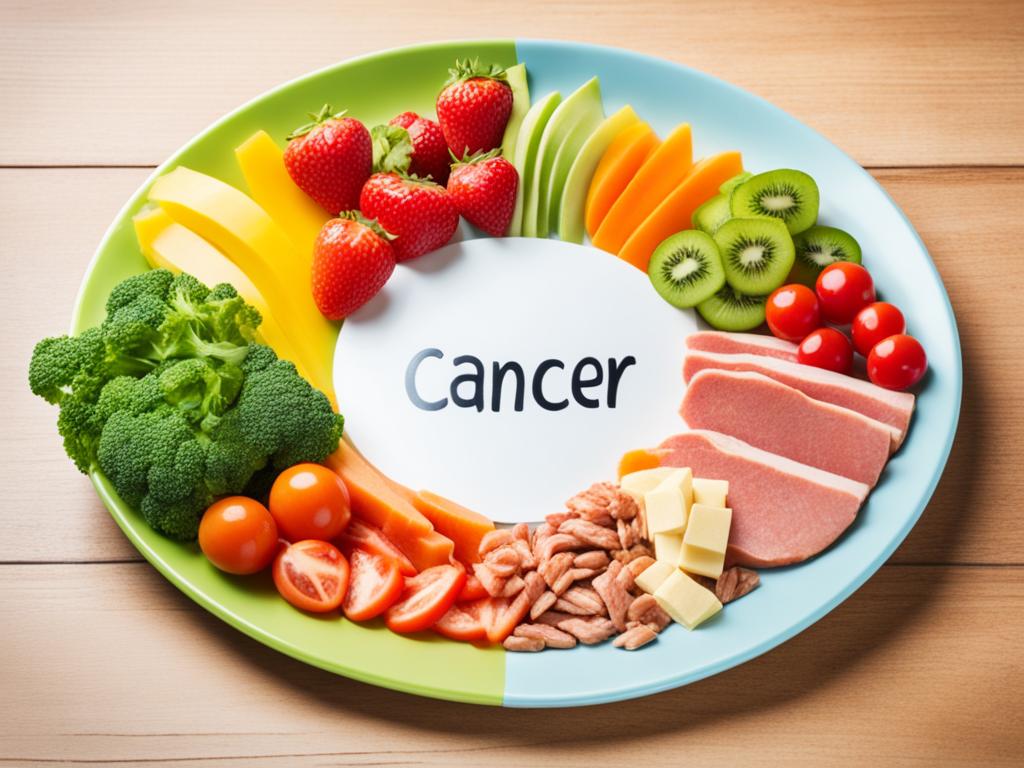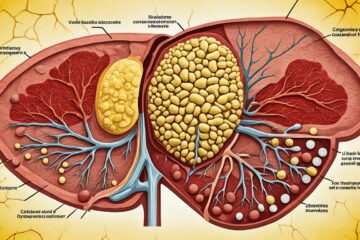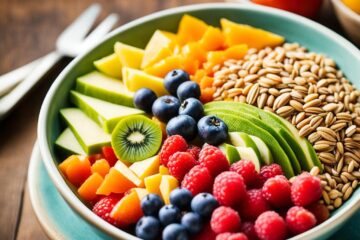When it comes to stopping cancer, our diet is a secret weapon. The food we eat doesn’t just fill our stomachs. It also helps lower our chances of getting cancer. Throughout this article, we’ll learn about the link between what we eat and cancer. You’ll get tips to pick foods that keep you healthy and lower your cancer risks.
Cancer is tough, but we can fight it with what we eat. Knowing which foods lower the risk of cancer gives us the power. We’ll talk about how fruits, veggies, and proteins help. With this info, you can start making your own anti-cancer diet plan.
Key Takeaways
- Certain foods and dietary patterns can significantly impact cancer risk, both positively and negatively.
- Antioxidant-rich fruits and vegetables, whole grains, and lean protein sources are essential components of an anti-cancer diet.
- Processed and red meats, refined carbohydrates, and added sugars should be limited or avoided to reduce cancer risk.
- Adopting healthy eating habits, such as meal planning and mindful portion control, can contribute to cancer prevention.
- Supplements may play a role in cancer prevention, but their use should be discussed with healthcare professionals.
Understanding the Link Between Diet and Cancer
The link between what we eat and cancer risk has undergone thorough study. Scientists now know that certain foods can heighten or lessen the chance of cancer. Knowing this, we can choose foods that boost our health and lower the risk of cancer.
How Diet Impacts Cancer Risk
Research shows food choices are closely tied to cancer. Some nutrients and chemicals, as well as processed foods, can aid or hinder cancer growth. For instance, diets heavy in processed and red meats seem to raise the risk of colorectal cancer. On the other hand, a plant-focused diet, full of antioxidant fruits and veggies, can decrease the risk.
The Role of Nutrition in Cancer Prevention
Knowing how food influences cancer risk is important. Nutrition plays a key part in preventing this disease. Eating a balanced diet helps the body’s defenses stay strong, lowers inflammation, and fights off dangerous free radicals. This proactive approach, which includes eating foods that battle cancer and living healthily, can reduce the chances of getting cancer and enhance general health.
| Dietary Factor | Impact on Cancer Risk |
|---|---|
| Processed and Red Meats | Increased risk of colorectal and other cancers |
| Fruits and Vegetables | Reduced risk of various types of cancer due to their antioxidant and anti-inflammatory properties |
| Whole Grains and Dietary Fiber | Decreased risk of colorectal and other digestive cancers |
| Refined Carbohydrates and Added Sugars | Increased risk of obesity and associated cancers, such as breast and colorectal cancer |
Foods to Include in an Anti-Cancer Diet
Creating an anti-cancer diet is all about variety. It focuses on foods rich in antioxidants, fruits, and veggies. Also, it includes whole grains for fiber and lean proteins.
Antioxidant-Rich Fruits and Vegetables
Berries, greens, tomatoes, and peppers are top picks. Why? Because they fight free radicals and lower inflammation that can lead to cancer. Eating these not only boosts immunity but also supports healthy cells.
Whole Grains and Fiber-Rich Foods
Oats, quinoa, and lentils are key for an anti-cancer plan. They’re full of fiber, great for digestion and reducing colon cancer risks. Plus, they keep you powered up evenly, avoiding sugar spikes.
Lean Protein Sources
Chicken, fish, and beans are must-haves. They repair cells and help you stay at a healthy weight. Be careful with processed and red meats, as they might up cancer chances.
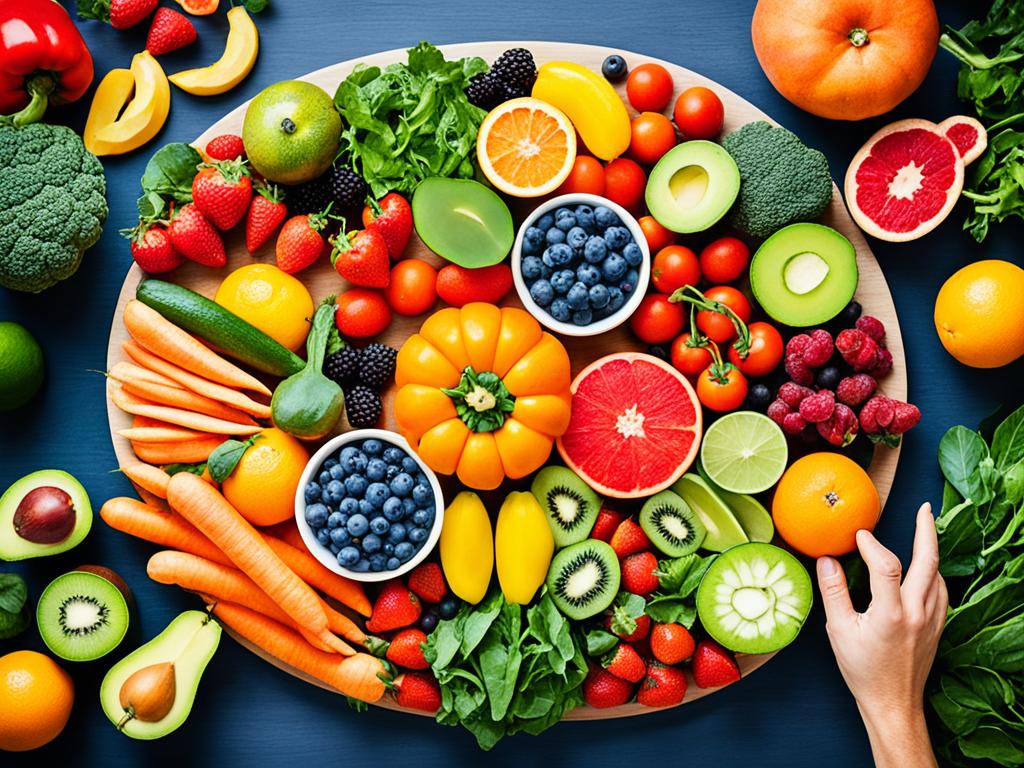
| Food Group | Cancer-Fighting Benefits | Examples |
|---|---|---|
| Antioxidant-Rich Fruits and Vegetables | Neutralize free radicals, reduce inflammation, and support immune function | Berries, leafy greens, tomatoes, bell peppers |
| Whole Grains and Fiber-Rich Foods | Maintain a healthy digestive system and reduce the risk of certain cancers | Oats, quinoa, brown rice, lentils |
| Lean Protein Sources | Provide the building blocks for cell repair and growth, and help maintain a healthy weight | Chicken, turkey, fish, legumes |
Adding these foods to your daily diet works wonders. It cuts down your cancer risk and keeps you healthy. So, eat well for a good life!
Alimentation et cancer: Les aliments à privilégier et ceux à éviter
L’alimentation est clé pour prévenir le cancer. Les aliments à privilégier pour lutter contre le cancer sont riches en antioxydants, fibres, et nutriments bons pour la santé. Par contre, les aliments à éviter sont souvent traités et riches en graisses saturées, ou sucres ajoutés, augmentant le risque de cancer.
Il vaut mieux manger des fruits, légumes, aliments riches en fibres et céréales complètes. Ajoutez à cela des protéines maigres comme le poisson et la volaille. Ces aliments fournissent des nutriments vitaux et des composés antioxydants, aidant à prévenir le cancer en limitant l’inflammation et protégeant les cellules.
Par contre, limitez votre consommation des viandes transformées et rouges, du pain blanc, des pâtes blanches et des sucreries. Ces aliments cancérigènes augmentent peut-être le risque de certains cancers.
| Aliments à privilégier | Aliments à éviter |
|---|---|
| Fruits et légumes colorés | Viandes transformées et rouges |
| Aliments riches en fibres (céréales complètes) | Aliments raffinés (pain blanc, pâtes blanches) |
| Sources de protéines maigres (poisson, volaille) | Aliments riches en sucres ajoutés (sodas, desserts) |
Choisir les bons aliments et réduire les aliments cancérigènes aide vraiment à prévenir le cancer. Ça contribue aussi à rester en bonne santé.
Foods to Limit or Avoid
Eating lots of plants can help fight cancer. But it’s smart to cut back on some foods that might make cancer more likely. Processed and red meats, and foods with a lot of sugar and carbs are the main ones to watch out for.
Processed and Red Meats
Studies show processed meats might up the risk of certain cancers. This group includes bacon, sausage, and cold cuts. They often have sodium nitrite, which can form cancer-causing stuff in your body. Eating a lot of red meats, like beef, pork, or lamb, might boost the chances of colorectal and prostate cancer. Their saturated fat and heme iron could play a part in this.
Refined Carbohydrates and Added Sugars
White bread, pasta, pastries, and sugary foods can cause inflammation and mess with blood sugar. This can make the body more likely to develop certain cancers. Choosing whole grain carbs over these options can cut down on these cancer risks.
Avoiding processed meats, red meats, sugary foods, and refined carbs is a big cancer prevention step. Eating plenty of different plant foods is a great way to stay healthy and lower your risk. Fill your plate with nutrient-rich plants to help fight cancer.
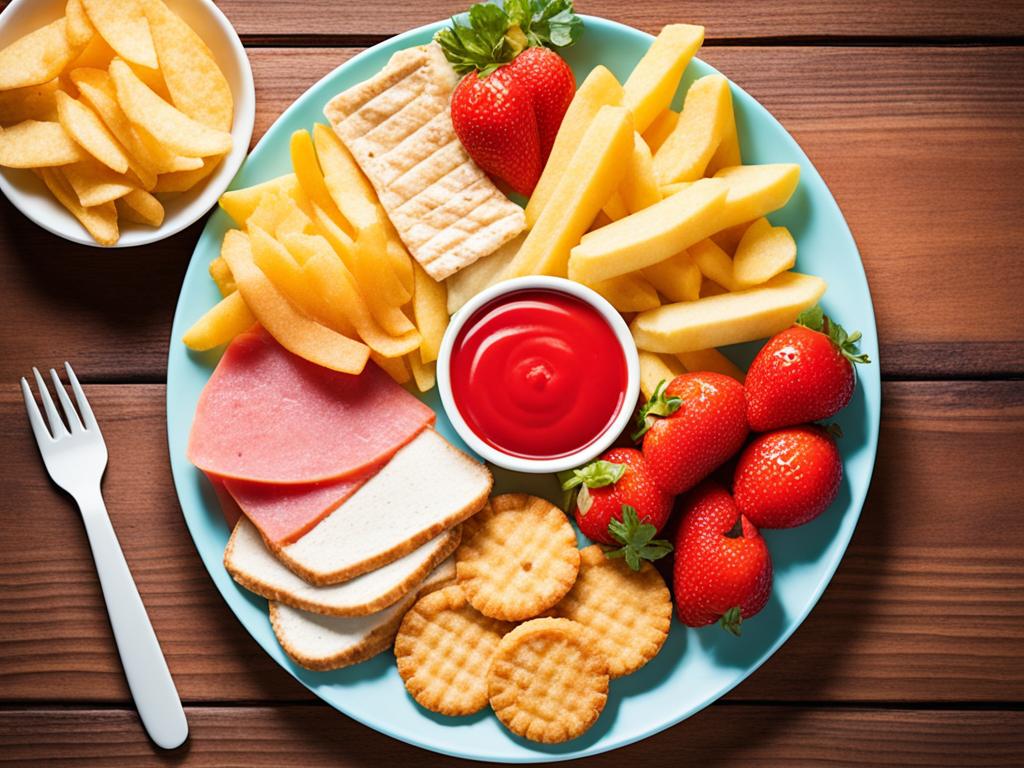
Incorporating Healthy Eating Habits
Maintaining a healthy, anti-cancer diet is more than picking good foods to eat. It means creating habits you can keep up easily. We’ll look at simple ways to plan your meals, prepare food, and eat mindfully.
This also includes watching how much you eat. Let’s dive into these tips to make an
anti-cancer lifestyle
happen and lower the risk of cancer through your diet.
Meal Planning and Preparation Tips
Planning and preparing meals right is key to a diet that fights cancer. Start by adding lots ofantioxidant-rich fruits and vegetables, whole grains, and lean protein sources to what you eat. Look for new recipes that fit your goals using recipe sites or apps.
Use extra time on the weekend to get food ready. Cut, cook, and keep ingredients for the week. This makes it simple to eat well, even when you’re busy. Having healthy options at hand means you’re less likely to choose unhealthy, sugary foods, which can raise your cancer risk.
Mindful Eating and Portion Control
Eating mindfully is key to staying healthy and fighting cancer. Try to pause and really enjoy your meals. This helps you notice when you’re full and stops you from overeating.
Keeping portion sizes in check is just as important. Using smaller plates and eating slowly can help. Paying attention to how full you feel, and what you eat, can really make a difference in staying healthy and not just in lowering your cancer risk.
The Role of Supplements in Cancer Prevention
A diet full of nutrients is key to fighting cancer. But many look to supplements for extra help. Things like antioxidant supplements, vitamins, and minerals might add more power to our battle with cancer.
Special antioxidant supplements that contain vitamins C and E, plus selenium, aim to fight off harmful free radicals. These can lower inflammation, which may lower our cancer risk. Dietary supplements with these strong antioxidants might boost our body’s defenses. They work alongside a healthy anti-cancer diet.
Vitamins and minerals such as vitamin D, omega-3s, and probiotics are also promising. They can improve our immune system and keep our cells healthy. Including these supplements in our health plan might also cut our cancer risk.
But, it’s very important to talk to your doctor before taking any supplements. Some antioxidant supplements and cancer-fighting supplements can help, but not all are proven safe and effective. Too much of a good thing, like over-supplementing, can cause harm. A doctor’s advice makes sure you use dietary supplements safely in fighting cancer.

Addressing Common Myths and Misconceptions
The link between diet and cancer sparks many myths. These myths can confuse us. It is important to know the truth. Use what science tells us to make choices that can help prevent cancer.
Separating Fact from Fiction
Some think eating certain “superfoods” or taking supplements can stop cancer. While a diet packed with cancer-fighting foods helps, it’s not a guaranteed shield. Preventing cancer with what we eat is complicated. It needs a lot of different foods working together.
Erasing whole food groups like carbs or fats won’t drop your cancer chances. It could actually be harmful. Skipping on foods can mean missing out on key nutrients. Instead, aim for a diet that’s balanced and filled with variety.
Understanding the Limitations of Dietary Interventions
A good diet is vital for keeping cancer away, but it’s not the only piece of the puzzle. Things like how active we are, how we handle stress, and what we’re exposed to also matter a lot.
Your personal traits, like your genes, also influence how diet affects your chance of getting cancer. What’s good for one may not be for another. Always talk to healthcare experts. Follow diet advice that comes from proven science. This is much better than following claims that don’t have real proof.
Combining Diet with Other Lifestyle Factors
A balanced diet is key to preventing cancer. But, other lifestyle aspects matter too. Things like staying active and managing stress are important. A mix of good food, exercise, and stress control is a great anti-cancer plan.
Exercise and Physical Activity
Being active lowers your cancer risk. It keeps you at a healthy weight and boosts your immune system. Studies show active people have less chance of breast, colon, and prostate cancer. Mix up your workouts with cardio, strength, and flexibility to stay healthy.
Stress Management and Mental Well-being
High stress might up your cancer risk. It weakens your immune system and causes inflammation. Handling stress with meditation, mindfulness, or relaxation helps. Being positive and finding joy with friends, hobbies, or therapy makes a difference too. This supports good mental health and helps prevent cancer.
A good diet, exercise, and stress control reduce your chance of getting cancer. They also make you feel better overall. This all-around lifestyle is the best way to guard against cancer and live a healthy life.
Conclusion
As we wrap up our talk on diet and cancer, it’s clear what we eat matters a lot. Choosing the right foods can lower our cancer risk and keep us healthier. This article stressed the value of an anti-cancer diet to fight this tough disease.
Eating food that’s good for us helps a lot. We should add in fruits, veggies, whole grains, and lean meats to our meals daily. Also, cutting back on things like processed meats and sugary foods can help. It reduces our risk of getting cancer and keeps us well.
But our path to wellness isn’t just about food. Activities like exercise, managing stress, and caring for our mental health are also big. They boost our health defense against cancer. By combining good food with these lifestyle choices, we can strive towards a healthier, less cancer-prone life.
